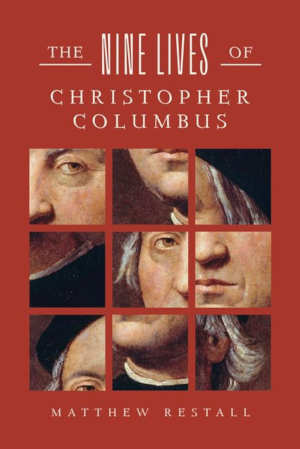The Nine Lives of Christopher Columbus
- Auteur: Matthew Restall (Engeland)
- Soort boek: biografie
- Taal: Engels
- Uitgever: W.W. Norton & Company
- Verschijnt: 8 oktober 2025
- Omvang: 368 pagina’s
- Uitgave: gebonden boek / ebook
- Prijs: $ 35,00
- Boek bestellen bij: Amazon / Bol
Matthew Restall The Nine Lives of Christopher Columbus review en recensie
- “In this compelling book, Matthew Restall comprehensively dismantles the myths surrounding Christopher Columbus while simultaneously revealing their power and importance for understanding his ever-changing legacy. A fascinating read for anyone seeking to understand how history is made, contested, and remembered.” (Caroline Dodds Pennock, author of On Savage Shores: How Indigenous Americans Discovered Europe)
- “I found The Nine Lives of Christopher Columbus to be a marvelous fusion of ingenuity and scholarship, a kaleidoscope of the explorer’s provocative legacies.” (Laurence Bergreen, author of Columbus: The Four Voyages)
Flaptekst van de Columbus biografie van Matthew Restall
A gifted historian presents a definitive book on Columbus—his life, his legacies, and the controversies that outlived him.
Christopher Columbus was born Cristoforo Colombo, in the autumn of 1451 in the Mediterranean port city of Genoa, and he died in the Spanish city of Valladolid in May 1506, as don Cristóbal Colón. More than five centuries later, we are still arguing over his life and its significance. Millions if not billions of people have learned his name. Most have some sense of what he did, that it was momentous, a great achievement, an act of primacy. But was his achievement “great” because he “discovered America” and thus made possible the hemisphere’s “great” nations? Or was it an apocalyptic catastrophe for tens of millions of Indigenous and African peoples?
In The Nine Lives of Christopher Columbus, acclaimed historian Matthew Restall, perhaps the leading scholar of the Spanish Empire, presents a new, authoritative biography of Columbus, while at the same time tracing his many afterlives down into our own time. He explores the mysteries, many of them manufactured, that color our understanding of Columbus even in the twenty-first century—mysteries surrounding Columbus’s name, nationality, place of birth, ancestry, education, religion, intellectual vision, moral fiber, sexual proclivities, and current resting place. He shows how Columbus became an iconic American hero in the nineteenth century, and how a parallel hero emerged in the form of the Italian American Columbus.
Restall takes us beyond polemic, sifting through the evidence across nations, languages, and five centuries to explore the many questions that make up what he calls “Columbiana.” He demonstrates that, far from a uniquely talented individual, Columbus was typical of the Iberian and northern Italian men of his day—a merchant mariner who became an explorer, slave-trader, and conquistador-settler. And Restall challenges the notion, deeply held to this day, that Columbus can be credited or blamed for all that happened after 1492.
Whatever one’s views of Columbus, Restall’s book is the necessary, definitive account. It dispels the myths and gives us Columbus as he was. It shows how he has been distorted in the centuries since his death—and how we might come to understand him, and his legacies, anew.
Matthew Restall is born on 17 March 1964 in London. He is the Edwin Erle Sparks Professor of History and Anthropology, and director of Latin American Studies, at Penn State University. He is the author of Seven Myths of the Spanish Conquest and When Montezuma Met Cortés, among other books.
